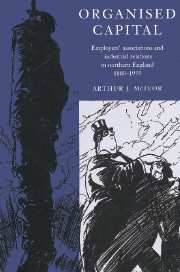Book contents
- Frontmatter
- Contents
- List of maps and tables
- Acknowledgements
- List of abbreviations
- Introduction
- Part 1 Setting the scene
- Part 2 Forging employers' organisations, 1880–1920
- 3 Organisation, membership and solidarity
- 4 Strikebreaking
- 5 Collective bargaining and procedural control
- 6 The impact of the First World War
- Part 3 Reacting to the economic slump, 1920–39
- Conclusion
- Bibliography
- Index
4 - Strikebreaking
Published online by Cambridge University Press: 14 October 2009
- Frontmatter
- Contents
- List of maps and tables
- Acknowledgements
- List of abbreviations
- Introduction
- Part 1 Setting the scene
- Part 2 Forging employers' organisations, 1880–1920
- 3 Organisation, membership and solidarity
- 4 Strikebreaking
- 5 Collective bargaining and procedural control
- 6 The impact of the First World War
- Part 3 Reacting to the economic slump, 1920–39
- Conclusion
- Bibliography
- Index
Summary
‘The rapid progress being made in the art of striking work’, the employers' journal Textile Mercury noted in 1896, ‘is a markedly distinctive feature of the closing years of the nineteenth century. ’ James Cronin has argued that in this context 1870 was a significant watershed. Thereafter, the offensive strike became an integral feature of union policy, strike propensity incrementally increased, with most militancy being clustered at the peak of the trade cycle, notably in three phases, 1871–3, 1889–90 and 1911–13. This process of escalating militancy had a salutary effect upon employers and their organisations. Such ‘petty tyranny’, Textile Mercury reported in 1892; ‘has exhibited a tendency to become further and more strongly accentuated. The educational influence of this course of conduct upon the employers has been very considerable and has given a great impetus to organisation. ’ As the ability of workers to sustain lengthy strikes increased, employers' strikebreaking mechanisms became more sophisticated, with employers' associations playing a key role in this process. Indeed, strikebreaking services lay at the heart of most employers' associations' functions in the late nineteenth century. This chapter examines this challenge-response relationship, focusing upon how employers' associations mobilised their resources to neutralise the strike weapon, discussing, in turn, the organisation of substitute labour for strikers, victimisation, legal action, strike indemnity and compensation schemes, and the utilisation of the lock-out. Collectively, this array of formidable weapons was aptly described by David Lloyd George as ‘the steam roller’.
- Type
- Chapter
- Information
- Organised CapitalEmployers' Associations and Industrial Relations in Northern England, 1880–1939, pp. 92 - 117Publisher: Cambridge University PressPrint publication year: 1996



